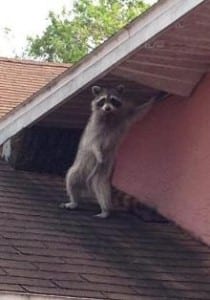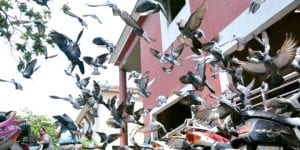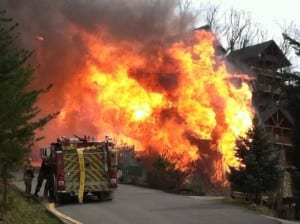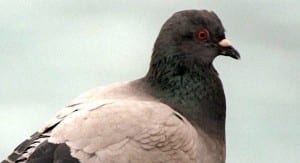
by Pigeon Patrol | Jul 8, 2016 | Animal Deterrent Products, Pigeon Patrol's Services, Pigeon Spikes
 The latest animal concerns have targeted skunks, which are far more populous in our area’s only city, especially in summer, than one would think.
The latest animal concerns have targeted skunks, which are far more populous in our area’s only city, especially in summer, than one would think.
The city had a $25,000 contract with a local man to provide animal control, including trapping and removing skunks. But as councilors prepared a tough 2016 budget, that funding was cut.
Resident Patti Hackett pointed out to councilors that about 70 skunks were captured in the city last year. She noted that skunks pose a rabies threat on top of the obvious irritation: the stink that prompts people to hold their breath and slam shut their windows. And dog owners can attest to the tenacity of that odor once it attaches to fur.
Improper garbage disposal is contributing to the problem of nuisance animals, and the city should clamp down on residents who don’t have trash secured in garbage cans with lids.
We aren’t suggesting fines; a city-sponsored education campaign, such as leaflets sent in the utility bills detailing the problems caused by exposed trash, could mitigate the problem.
The city is looking into a skunk-trapping campaign this spring. Some “lucky” crew could be paid around $10,000 to seek out known skunk dens and snag the creatures before they start breeding.
The Press-Republican believes that every community that has a fairly large population concentration should offer some kind of animal control.
Many towns contract with local animal shelters or have part-time officers or pay by the job to remove nuisance animals. A few wildlife rehabilitators help out with certain types of creatures.
Certainly a city the size of Plattsburgh can afford $25,000 for animal control in a $53.1 million budget. That amount is justified when measured against the service rendered — ask anyone who has watched a smelly skunk waddle through the back yard.
Maybe the city can share this service with the Town of Plattsburgh, whose residents are also in the line of spray.
But the most acute animal problem in larger communities is not the distinctively marked black and white invaders — it is feral cats.
Overrunning neighborhoods, getting into garbage and, most sadly, suffering starvation, exposure and sickness, wild cats present an overwhelming concern that few municipal governments are properly addressing.
Because shelters and a smattering of other aid programs exist, public officials act as though they are off the hook as cats continue to breed, live and die in corners of our neighborhoods.
It is inhumane to the cats and frustrating and heartbreaking for humans.
Every municipality with a population center, especially the City of Plattsburgh, should be investing in trap, neuter and release programs to reduce the feral-cat population.
About Pigeon Patrol:
Pigeon Patrol Products & Services is the leading manufacturer and distributor of bird deterrent (control) products in Canada. Pigeon Patrol products have solved pest bird problems in industrial, commercial, and residential settings since 2000, by using safe and humane bird deterrents with only bird and animal friendly solutions. At Pigeon Patrol, we manufacture and offer a variety of bird deterrents, ranging from Ultra-flex Bird Spikes with UV protection, Bird Netting, 4-S Gel and the best Ultrasonic and audible sound devices on the market today.
Voted Best Canadian wholesaler for Bird Deterrent products four years in a row.
Contact Info: 1- 877– 4– NO-BIRD (www.pigeonpatrol.ca)

by Pigeon Patrol | Jul 7, 2016 | Bird Deterrent Products, Pigeon Spikes, Pigeons in the News
 There’s a bit of a problem with pigeons in Islington.
There’s a bit of a problem with pigeons in Islington.
Hundreds, nay thousands of the sky rats have been pictured landing on rooftops and in parks around the London neighbourhood.
A council has now written to people in the area saying that they believe the problem is down to people feeding them creating an ‘unsightly mess’.
They’ve even threatened court action that could lead to people being evicted and have appointed a ‘professional witness’ to gather evidence of pigeon feeders.
In its threatening letter, the council wrote: ‘Islington council have appointed a “professional witness” to obtain video and hear say evidence to identify culprits of this behaviour. No further warnings will be given regarding this issue.’
The authority has since said that letter was delivered to houses on the Palmer Estate ‘in error’.
About Pigeon Patrol:
Pigeon Patrol Products & Services is the leading manufacturer and distributor of bird deterrent (control) products in Canada. Pigeon Patrol products have solved pest bird problems in industrial, commercial, and residential settings since 2000, by using safe and humane bird deterrents with only bird and animal friendly solutions. At Pigeon Patrol, we manufacture and offer a variety of bird deterrents, ranging from Ultra-flex Bird Spikes with UV protection, Bird Netting, 4-S Gel and the best Ultrasonic and audible sound devices on the market today.
Voted Best Canadian wholesaler for Bird Deterrent products four years in a row.
Contact Info: 1- 877– 4– NO-BIRD (www.pigeonpatrol.ca)

by Pigeon Patrol | Jul 6, 2016 | Bird Deterrent Products, Bird Netting, Pigeon Patrol's Services
 A pigeon club member has spoken of his devastation after 100 of his birds were killed in a suspected arson attack.
A pigeon club member has spoken of his devastation after 100 of his birds were killed in a suspected arson attack.
After seeing the flames from his Washington home, Bill Scott rushed to Barmston Allotments to try and save the birds he has been racing since 2009, but all perished in the fire.
Crews from Washington and Marley Park spent three hours tackling the blaze on Saturday night which saw the lofts razed to the ground.
Bill, 62, has been told that the incident, which happened at around 9pm, is being treated as suspected arson.
“It’s devastating to get there and see those birds on the ground, knowing I couldn’t get to them,” he said. “There were seventy adult birds and thirty young ones who had only just hatched.
“I live at the other side of the railway track from the allotments. I saw the smoke and could smell it, but didn’t realise it was the allotments until I looked out of the window.”
Though Bill’s birds could not be saved, his son Hayden, 22, managed to save some birds from a neighbouring loft.
The dad added: “Since I’ve left work I’m down here every day. I’m in a racing club and they are good pigeons. It’s devastating because they won’t fly at night, so even if they could get out of the loft, they wouldn’t fly, they just sit there and burn.”
He added: “I’ve been told that it was multiple fires so someone has set out to destroy the loft deliberately. I can’t bring my birds back, but I hope something can be done to stop this happening again.”
In 2012, thousands of pounds in damage was caused when fire tore through the same allotments.
The fierce blaze destroyed years of hard work by proud owners and left the ground scorched and covered in ash. On that occasion, fanciers had been able to save some of the birds.
About Pigeon Patrol:
Pigeon Patrol Products & Services is the leading manufacturer and distributor of bird deterrent (control) products in Canada. Pigeon Patrol products have solved pest bird problems in industrial, commercial, and residential settings since 2000, by using safe and humane bird deterrents with only bird and animal friendly solutions. At Pigeon Patrol, we manufacture and offer a variety of bird deterrents, ranging from Ultra-flex Bird Spikes with UV protection, Bird Netting, 4-S Gel and the best Ultrasonic and audible sound devices on the market today.
Voted Best Canadian wholesaler for Bird Deterrent products four years in a row.
Contact Info: 1- 877– 4– NO-BIRD (www.pigeonpatrol.ca)

by Pigeon Patrol | Jul 5, 2016 | 4-S Gel Bird repellent, Animal Deterrent Products, Bird Netting
 A new ban in this New Mexico city is ruffling a lot of feathers.
A new ban in this New Mexico city is ruffling a lot of feathers.
Carlsbad’s city council passed an ordinance prohibiting feeding pigeons, with punishments that could mean fines or even jail time.
The Cavern City blamed pigeons for spreading disease, damaging buildings and ruining outdoor experiences in the ordinance.
Many of the public health risks come from an abundance of pigeon droppings across the city.
The ban’s goal is to drive the pigeon population down by cutting off their food supply.
Pigeons have become a major issue for this New Mexico city, officials noted.
Pigeons have become a major issue for this New Mexico city, officials noted.
“It will help move them away from the city, move them out of the middle of this city,” Woods Hougton, program director for the Eddy Count Extension Office, told KRQE. “They’re called trash birds because they communicate a lot of known diseases to both livestocks and humans.”
The feeding ban will only apply to feral pigeons, as “domesticated birds used for recreation, racing, or show,” as well as injured pigeons being rehabilitated are excluded from the new ordinance.
Enthusiasts with feeders will be allowed to keep their birdhouses as well — as long as it doesn’t attract more pigeons.
While violating the feeding law can result in a harsh punishment, council members have said they hope it will not escalate to jail time.
About Pigeon Patrol:
Pigeon Patrol Products & Services is the leading manufacturer and distributor of bird deterrent (control) products in Canada. Pigeon Patrol products have solved pest bird problems in industrial, commercial, and residential settings since 2000, by using safe and humane bird deterrents with only bird and animal friendly solutions. At Pigeon Patrol, we manufacture and offer a variety of bird deterrents, ranging from Ultra-flex Bird Spikes with UV protection, Bird Netting, 4-S Gel and the best Ultrasonic and audible sound devices on the market today.
Voted Best Canadian wholesaler for Bird Deterrent products four years in a row.
Contact Info: 1- 877– 4– NO-BIRD (www.pigeonpatrol.ca)

by Pigeon Patrol | Jul 4, 2016 | 4-S Gel Bird repellent, Bird Deterrent Products, UltraSonic Bird Control
 A rat or pigeon might not be the obvious choice to tend to someone who is sick, but these creatures have some superior skills that could help the diagnosis and treatment of human diseases.
A rat or pigeon might not be the obvious choice to tend to someone who is sick, but these creatures have some superior skills that could help the diagnosis and treatment of human diseases.
Pigeons are often seen as dirty and an urban nuisance, but they are just the latest in a long line of animals that have been found to have abilities to help humans.
Despite having a brain no bigger than the tip of your index finger, pigeons have an impressive visual memory.
Recently it was shown that they could be trained to be as accurate as humans at detecting breast cancer in images.
Here are three more of our feathered and furry friends who could have a big impact in medicine.
From lab rats to lab technicians
Rats are often associated with spreading disease rather than preventing it, but this long-tailed rodent is a highly sensitive detector that can save lives.
Inside a rodent’s nose are up to 1,000 different types of olfactory receptors, whereas humans only have a feeble 100 to 200 types. This gives rodents, such as rats, the ability to sniff out subtle scents.
As a result, African-pouched rats – commonly described as “kitten-sized rodents” – are being put to work in Mozambique to detect tuberculosis.
The African pouched rats are highly accurate TB detectors
Their abilities are being studied at the Eduardo Mondlane University in Maputo, where trained rats can detect a specific scent produced by TB bacteria in human mucus samples.
When the rats detect the scent, they stop and rub their legs to indicate a sample is infected.
Traditionally, lab technicians prepare slides and examine each sample using microscopy. A hundred samples would take them more than two days, but for a rat it takes less than 20 minutes.
This rat detection method is affordable and doesn’t rely on specialist equipment, which is often lacking in countries where TB is prevalent.
It is also more accurate – the rats are able to find more TB infections and, therefore, save more lives.
Doctor dog – the emergency seizure detector
Dogs have long been considered a human’s best friend – but over the years they’ve really proved how skilful they can be.
Recently, there has also been a focus on dogs that seem to have the extraordinary ability to detect when people with epilepsy are about to have a seizure – even when the person has no idea themselves.
Sally Burton’s epilepsy began as a child and affected every aspect of her life from a young age.
“I could never be left alone,” she says. “I had to be home taught and making friends or meeting new people was difficult. I often felt very lonely.”
Thirteen years ago she got her first seizure alert dog, Star.
“Having a seizure alert dog instantly made my life liveable,” Sally explains.
Robbie warns Sally when she is going to have a seizure
“One of the first things I did when I first had Star was to make myself a cup of tea, something I had not been able to do in 30 years because of the risks of having a seizure when holding boiling water. I then went into town on my own – again a life-time first.”
It is still not known how dogs can sense a seizure. It has been suggested that minute changes in a person’s gestures or posturing could alert the dog, but people have also thought that a scent or auditory cue might also be involved.
After Star passed away, Sally teamed up with her second dog Robbie. Like Star, he was trained by a British charity, Support Dogs.
The charity has shown they are able to train dogs that are able to provide signals, such as persistently nudging someone’s leg, between 15 and 45 minutes before their owner had a seizure.
Although there is still little other published evidence to back up their effectiveness, the anecdotal evidence for seizure dogs like Robbie is strong.
“When I am out it is reassuring to know that Robbie will give me a 100% reliable 50-minute warning prior to every oncoming seizure I have – so plenty of time to get somewhere safe,” Sally says.
The secrets of cow saliva
Drool, dribble, or spit. Whatever you call it, saliva can be thought of as disgusting. But many animals lick their wounds, applying liberal amounts of the stuff to try and prevent infection.
Saliva across the animal kingdom can have antimicrobial properties – including saliva from the humble cow.
Studies have shown that there are proteins in a cow’s bodily fluids, including its saliva and milk, that have bug-fighting properties.
Saliva across the animal kingdom has been shown to have antimicorbial properties
Salvia also contains proteins – called mucins – that can work to prevent further bacteria entering the wound.
Experts don’t recommend letting an animal lick your wounds as they could introduce other bacteria, but if you don’t fancy that then, luckily, your own spit also contains antibacterial properties.
About Pigeon Patrol:
Pigeon Patrol Products & Services is the leading manufacturer and distributor of bird deterrent (control) products in Canada. Pigeon Patrol products have solved pest bird problems in industrial, commercial, and residential settings since 2000, by using safe and humane bird deterrents with only bird and animal friendly solutions. At Pigeon Patrol, we manufacture and offer a variety of bird deterrents, ranging from Ultra-flex Bird Spikes with UV protection, Bird Netting, 4-S Gel and the best Ultrasonic and audible sound devices on the market today.
Voted Best Canadian wholesaler for Bird Deterrent products four years in a row.
Contact Info: 1- 877– 4– NO-BIRD (www.pigeonpatrol.ca)

 The latest animal concerns have targeted skunks, which are far more populous in our area’s only city, especially in summer, than one would think.
The latest animal concerns have targeted skunks, which are far more populous in our area’s only city, especially in summer, than one would think.

 There’s a bit of a problem with pigeons in Islington.
There’s a bit of a problem with pigeons in Islington.
 A pigeon club member has spoken of his devastation after 100 of his birds were killed in a suspected arson attack.
A pigeon club member has spoken of his devastation after 100 of his birds were killed in a suspected arson attack.
 A new ban in this New Mexico city is ruffling a lot of feathers.
A new ban in this New Mexico city is ruffling a lot of feathers.
 A rat or pigeon might not be the obvious choice to tend to someone who is sick, but these creatures have some superior skills that could help the diagnosis and treatment of human diseases.
A rat or pigeon might not be the obvious choice to tend to someone who is sick, but these creatures have some superior skills that could help the diagnosis and treatment of human diseases.